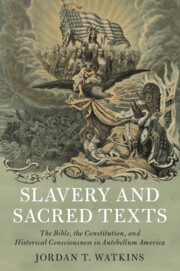‘Watkins examines an impressively wide range of thinkers, white and Black, famous and forgotten, as they argued over whether Scripture and the Constitution (itself a kind of secular ‘scripture’) supported slavery - and if so, how opponents of slavery should respond. This important book not only illuminates the striking parallels between biblical criticism and constitutional interpretation, it will help Americans think through the racism at the root of so many of our institutions.’
Dean Grodzins - author of American Heretic: Theodore Parker and Transcendentalism
‘Watkins tells a fascinating story of conceptual change, an account as ironic as it is important. He vividly shows how a reverence for the past tangled with the moral crisis of human slavery to generate a new kind of historical consciousness. Some of modernity’s most characteristic patterns of thought result from the history he has recovered.’
David Frank Holland - Harvard Divinity School
‘Watkins’ comparison of debates over constitutional interpretation and biblical hermeneutics is revelatory at every turn. This book is an essential read for scholars of law, religion, and slavery - and for anyone seeking to understand how the past haunts the present in American life.’
Margot Minardi - author of Making Slavery History: Abolitionism and the Politics of Memory in Massachusetts
‘Watkins persuasively demonstrates how in shoring up the Bible and the Constitution for the debates over slavery, nineteenth-century Americans evoked an awareness of temporal distance, a new historical consciousness. Antebellum-era struggles with time and history come to life in this insightful and compelling study, which substantially propels our understanding of historicism.’
Eran Shalev - University of Haifa
‘The book makes clear contributions to the study of religion in America and US constitutional history, and is readable for a wider public.’
John Fadden
Source: Reading Religion
'… the book … makes a real contribution to our understanding of the antebellum slavery debates and their legacy in American public life since. Scholars who work on religion, law, and/or slavery will benefit from reading this book.'
Paul J. Gutacker
Source: Journal of Church and State





